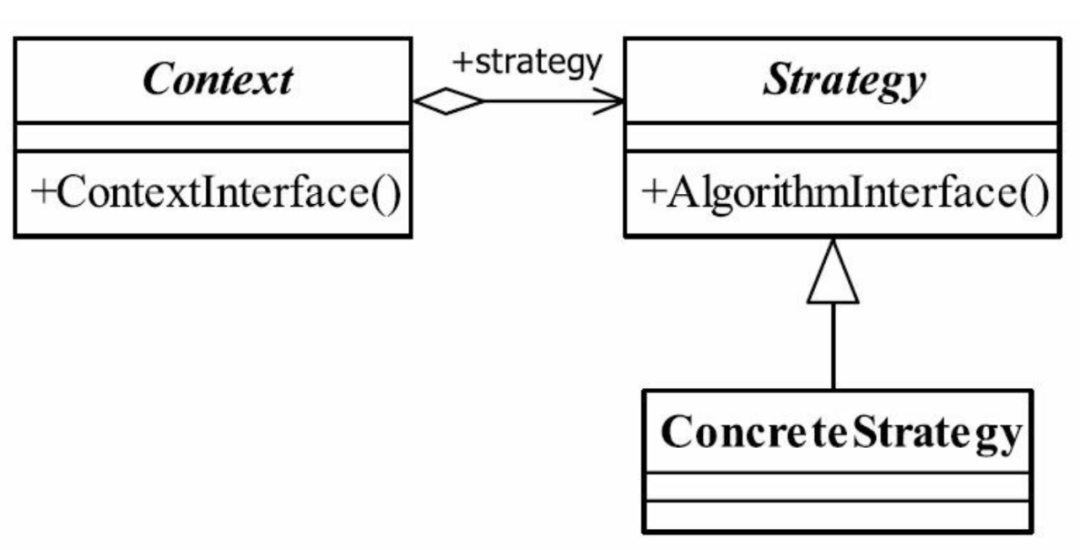哈喽,大家好,我是指北君。
相信大家日常开发中会经常写各种分支判断语句,比如 if-else ,当分支较多时,代码看着会比较臃肿,那么如何优化呢?
1.什么是策略模式?
Define a family of algorithms, encapsulate each one, and make them interchangeable. Strategy lets the algorithm vary independently from clients that use it.
策略模式(Strategy Pattern):定义一族算法类,将每个算法分别封装起来,让它们可以互相替换。
2.策略模式定义

①Context封装角色
它也叫做上下文角色, 起承上启下封装作用, 屏蔽高层模块对策略、 算法的直接访问,封装可能存在的变化。
②Strategy 抽象策略角色
策略、 算法家族的抽象, 通常为接口, 定义每个策略或算法必须具有的方法和属性。
③ConcreteStrategy 具体策略角色
实现抽象策略中的操作, 该类含有具体的算法。
3.策略模式通用代码
public class Context {
// 抽象策略
private Strategy strategy = null;
// 构造函数设置具体策略
public Context(Strategy strategy) {
this.strategy = strategy;
}
// 封装后的策略方法
public void doAnything(){
this.strategy.doSomething();
}
}
public interface Strategy {
// 策略模式的运算法则
public void doSomething();
}public class ConcreteStrategy1 implements Strategy{
@Override
public void doSomething() {
System.out.println("ConcreteStrategy1");
}
}
public class ConcreteStrategy2 implements Strategy{
@Override
public void doSomething() {
System.out.println("ConcreteStrategy2");
}
}
测试:
public class StrategyClient {
public static void main(String[] args) {
// 声明一个具体的策略
Strategy strategy = new ConcreteStrategy1();
// 声明上下文对象
Context context = new Context(strategy);
// 执行封装后的方法
context.doAnything();
}
}
4.用策略模式改写if-else
假设我们要处理一个office文件,分为三种类型 docx、xlsx、pptx,分别表示Word文件、Excel文件、PPT文件,根据文件后缀分别解析。
4.1 常规写法
public class OfficeHandler {
public void handleFile(String filePath){
if(filePath == null){
return;
}
String fileExtension = getFileExtension(filePath);
if(("docx").equals(fileExtension)){
handlerDocx(filePath);
}else if(("xlsx").equals(fileExtension)){
handlerXlsx(filePath);
}else if(("pptx").equals(fileExtension)){
handlerPptx(filePath);
}
}
public void handlerDocx(String filePath){
System.out.println("处理docx文件");
}
public void handlerXlsx(String filePath){
System.out.println("处理xlsx文件");
}
public void handlerPptx(String filePath){
System.out.println("处理pptx文件");
}
private static String getFileExtension(String filePath){
// 解析文件名获取文件扩展名,比如 文档.docx,返回 docx
String fileExtension = filePath.substring(filePath.lastIndexOf(".")+1);
return fileExtension;
}
}
处理逻辑全部放在一个类中,会导致整个类特别庞大,假设我们要新增一种类型处理,比如对于2007版之前的office文件,后缀分别是 doc/xls/ppt,那我们得增加 else if 逻辑,违反了开闭原则,如何解决这种问题呢,答案就是通过策略模式。
4.2 策略模式改写
public interface OfficeHandlerStrategy {
void handlerOffice(String filePath);
}
public class OfficeHandlerDocxStrategy implements OfficeHandlerStrategy {
@Override
public void handlerOffice(String filePath) {
System.out.println("处理docx");
}
}
// 省略 OfficeHandlerXlsxStrategy/OfficeHandlerPptxStrategy 类
public class OfficeHandlerStrategyFactory {
private static final Map<String,OfficeHandlerStrategy> map = new HashMap<>();
static {
map.put("docx",new OfficeHandlerDocxStrategy());
map.put("xlsx",new OfficeHandlerXlsxStrategy());
map.put("pptx",new OfficeHandlerPptxStrategy());
}
public static OfficeHandlerStrategy getStrategy(String type){
return map.get(type);
}
}
测试:
public class OfficeHandlerStrategyClient {
public static void main(String[] args) {
String filePath = "C://file/123.xlsx";
String type = getFileExtension(filePath);
OfficeHandlerStrategy strategy = OfficeHandlerStrategyFactory.getStrategy(type);
strategy.handlerOffice(filePath);
}
private static String getFileExtension(String filePath){
// 解析文件名获取文件扩展名,比如 文档.docx,返回 docx
String fileExtension = filePath.substring(filePath.lastIndexOf(".")+1);
return fileExtension;
}
}
4.策略模式优点
①算法可以自由切换
这是策略模式本身定义的, 只要实现抽象策略, 它就成为策略家族的一个成员, 通过封装角色对其进行封装, 保证对外提供“可自由切换”的策略。
②避免使用多重条件判断
简化多重if-else,或多个switch-case分支。
③扩展性良好
增加一个策略,只需要实现一个接口即可。
5.策略模式应用场景
①多个类只有在算法或行为上稍有不同的场景。
②算法需要自由切换的场景。
③需要屏蔽算法规则的场景。































